Top Rankings
Prairie Grove School District ranks among the top 20% of public school district in Arkansas for:
Category
Attribute
Graduation Rate
Highest graduation rate (Top 20%)
For the 2025 school year, there is 1 public preschool serving 801 students in Prairie Grove School District. This district's average pre testing ranking is 7/10, which is in the top 50% of public pre schools in Arkansas.
Public Preschool in Prairie Grove School District have an average math proficiency score of 49% (versus the Arkansas public pre school average of 42%), and reading proficiency score of 38% (versus the 35% statewide average).
Minority enrollment is 18% of the student body (majority Hispanic), which is less than the Arkansas public preschool average of 47% (majority Black).
Overview
This School District
This State (AR)
# Schools
4 Schools
152 Schools
# Students
2,216 Students
64,218 Students
# Teachers
180 Teachers
3,896 Teachers
Student : Teacher Ratio
12:1
12:1
District Rank
Prairie Grove School District, which is ranked within the top 30% of all 258 school districts in Arkansas (based off of combined math and reading proficiency testing data) for the 2021-2022 school year.
The school district's graduation rate of 90-94% has increased from 85-89% over five school years.
Overall District Rank
#64 out of 259 school districts
(Top 30%)
(Top 30%)
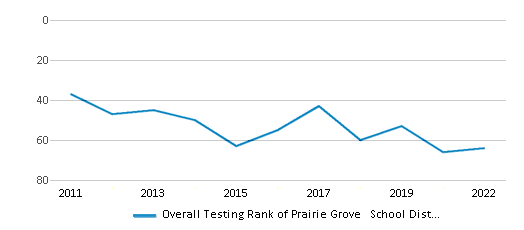
Math Test Scores (% Proficient)
44%
38%
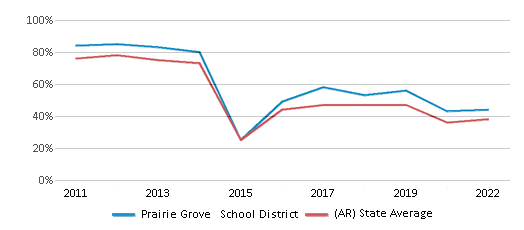
Reading/Language Arts Test Scores (% Proficient)
44%
40%
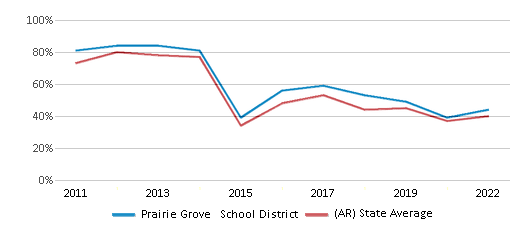
Science Test Scores (% Proficient)
41%
36%
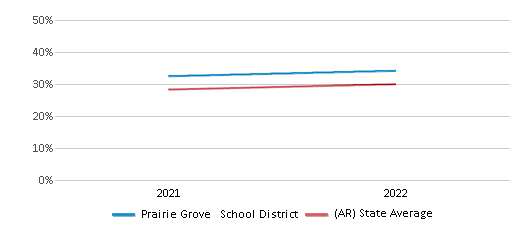
Graduation Rate
90-94%
88%
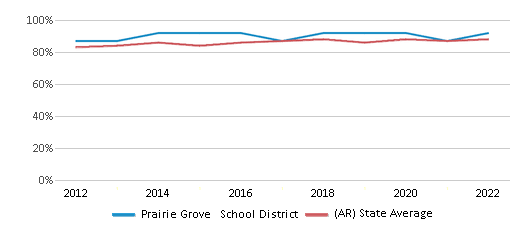
Students by Ethnicity:
Diversity Score
0.33
0.65
# American Indian Students
46 Students
304 Students
% American Indian Students
2%
n/a
# Asian Students
32 Students
1,286 Students
% Asian Students
2%
2%
# Hispanic Students
202 Students
8,907 Students
% Hispanic Students
9%
14%
# Black Students
28 Students
15,458 Students
% Black Students
1%
24%
# White Students
1,799 Students
33,786 Students
% White Students
81%
53%
# Hawaiian Students
5 Students
433 Students
% Hawaiian Students
n/a
1%
# Two or more races Students
104 Students
4,044 Students
% of Two or more races Students
5%
6%
Students by Grade:
# Students in PK Grade:
99
10,082
# Students in K Grade:
178
11,994
# Students in 1st Grade:
178
10,563
# Students in 2nd Grade:
160
10,072
# Students in 3rd Grade:
186
7,942
# Students in 4th Grade:
158
6,793
# Students in 5th Grade:
166
5,152
# Students in 6th Grade:
177
1,597
# Students in 7th Grade:
161
22
# Students in 8th Grade:
158
-
# Students in 9th Grade:
169
-
# Students in 10th Grade:
150
-
# Students in 11th Grade:
147
-
# Students in 12th Grade:
129
-
# Ungraded Students:
-
1
District Revenue and Spending
The revenue/student of $11,264 in this school district is less than the state median of $13,132. The school district revenue/student has declined by 6% over four school years.
The school district's spending/student of $11,699 is less than the state median of $13,043. The school district spending/student has declined by 6% over four school years.
Total Revenue
$25 MM
$6,371 MM
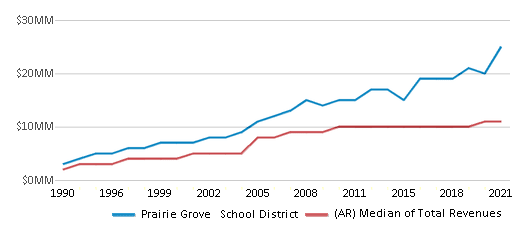
Spending
$26 MM
$6,327 MM
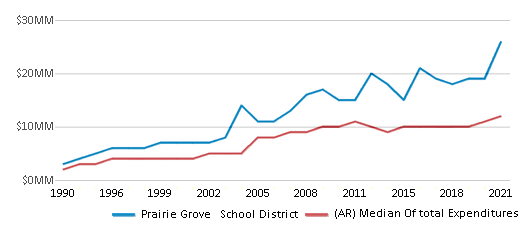
Revenue / Student
$11,264
$13,132
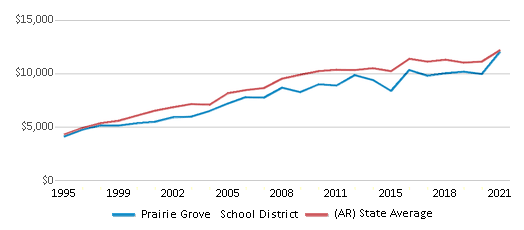
Spending / Student
$11,699
$13,043
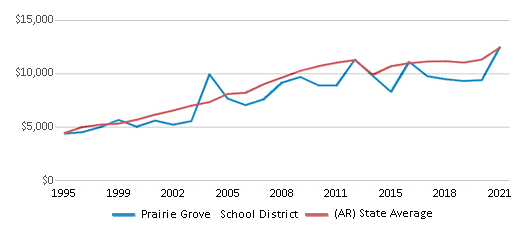
Best Prairie Grove School District Public Preschools (2025)
School
(Math and Reading Proficiency)
(Math and Reading Proficiency)
Location
Grades
Students
Rank: #11.
Prairie Grove Elementary School
(Math: 49% | Reading: 38%)
Rank:
Rank:
7/
Top 50%10
300 Ed Staggs Dr
Prairie Grove, AR 72753
(479) 846-4210
Prairie Grove, AR 72753
(479) 846-4210
Grades: PK-3
| 801 students
Recent Articles

Year-Round Or Traditional Schedule?
Which is more appropriate for your child? A year-round attendance schedule or traditional schedule? We look at the pros and cons.

Why You Should Encourage Your Child to Join a Sports Team
Participating in team sports has a great many benefits for children, there is no doubt. In this article you will learn what those benefits are.

White Students are Now the Minority in U.S. Public Schools
Increasing birth rates among immigrant families from Asia and Central and South America, combined with lower birth rates among white families, means that for the first time in history, public school students in the United States are majority-minority. This shift in demographics poses difficulties for schools as they work to accommodate children of varying language abilities and socio-economic backgrounds.





